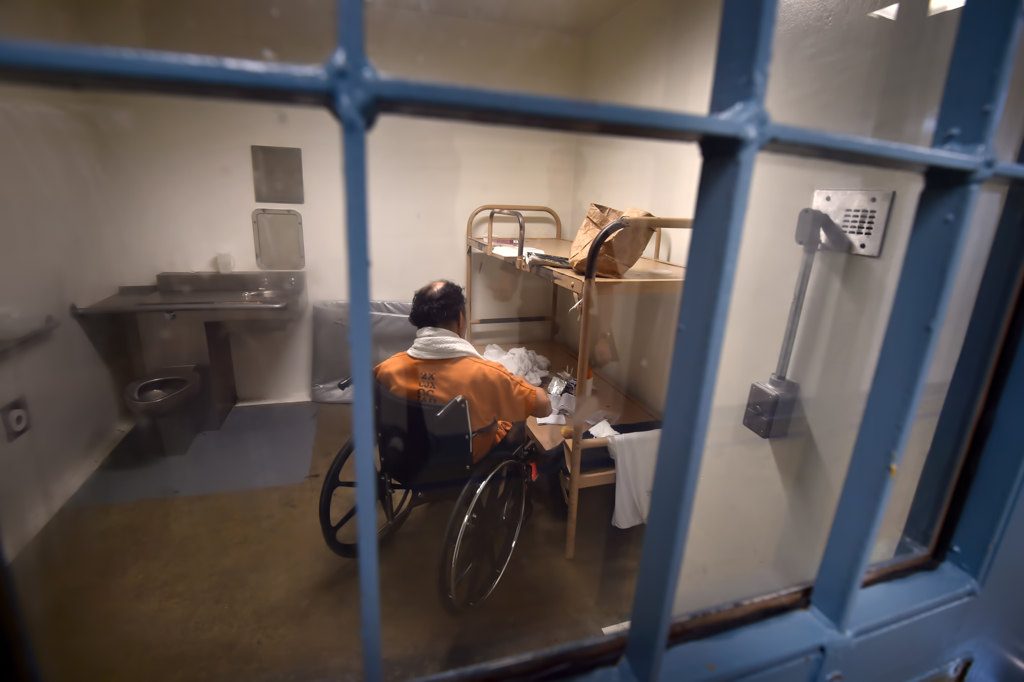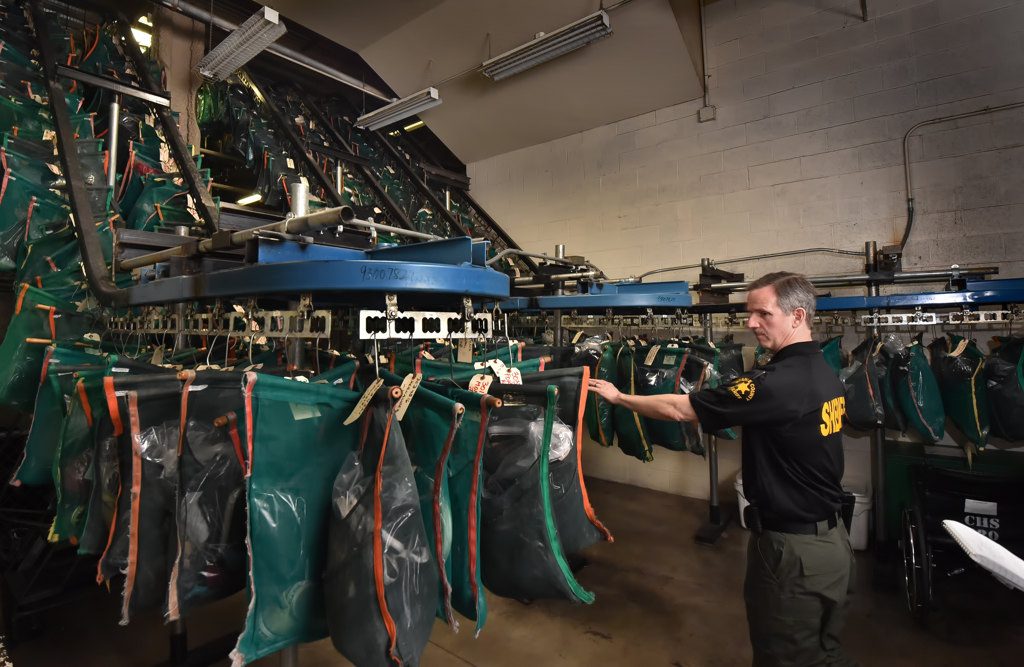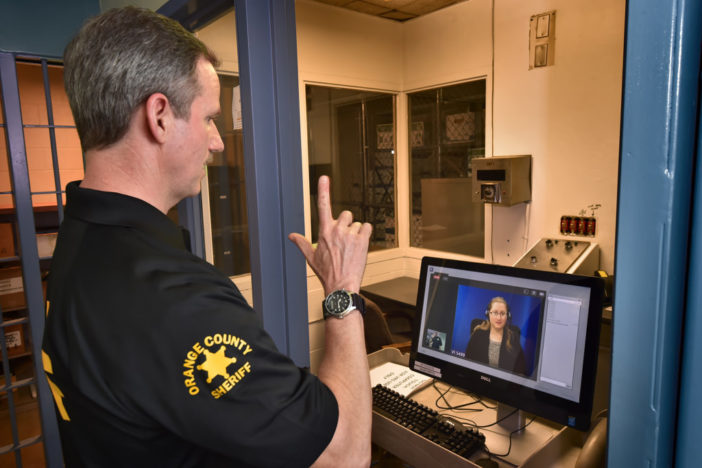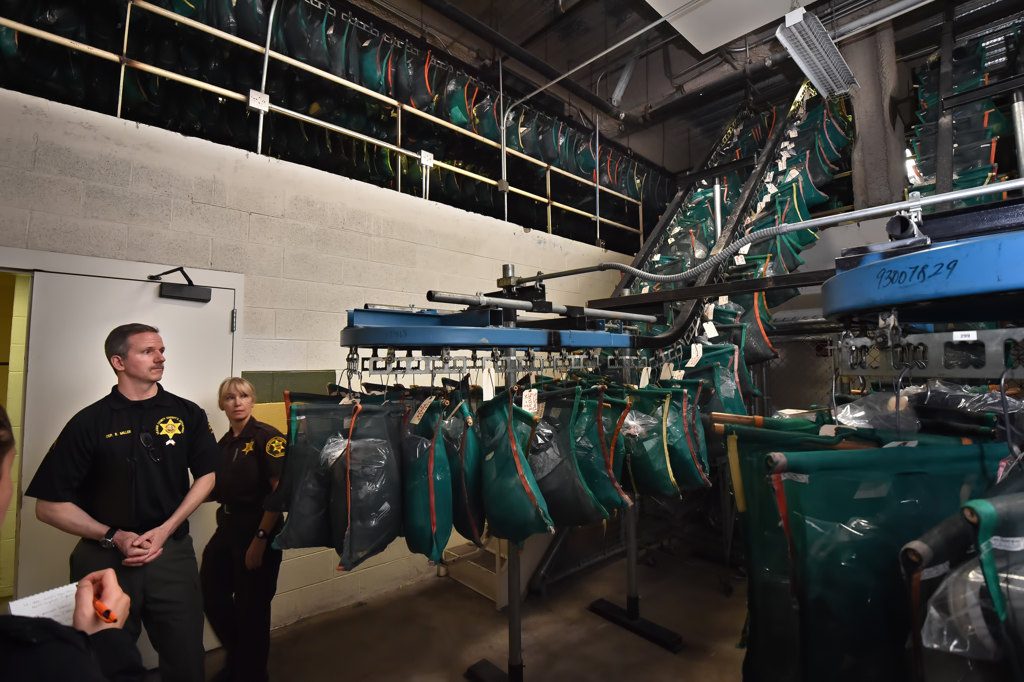Compliance Deputy Ron Miller says he often asks his sheriff’s academy students to imagine if their dad was brought into custody of the jails.
How would they want him treated?
More specifically: Imagine he was in a wheelchair in custody. How would they want him treated then?
The answer is the same for both: fairly.
It’s the guiding principle underlying the work of Miller and his team under the federal Americans with Disabilities Act (ADA): protecting the civil rights of those with disabilities – in this case, inmates in the Orange County jail system.
Miller, who has been with the Orange County Sheriff’s Department for 23 years, oversees ADA inmates for Central Men’s and Women’s Jails and the Intake Release Center.
It’s a facet of the OCSD’s custody operations not often thought of by those on the outside, but one that demands rigorous attention to detail and a constant evaluation of best practices.
“Failure to identify, track and monitor them can have severe consequences for agencies that fail to abide by that,” said Miller.
In fact, OCSD felt the weight of those consequences some years ago after an ADA inmate sued the department for compliance issues.
The suit, which ultimately lasted 13 years, prompted the formation of the ADA Compliance Unit, which overhauled the way the Sheriff’s Department worked with ADA inmates.
Improvements made over the years has positioned OCSD as a model agency for ADA practices in jail facilities.
Since the unit was formed, about 3,000 ADA inmates have come through Orange County jails.
“Because of our early experience with ADA, we’ve been contacted by a lot of agencies,” Miller said.
Some of those improvements include height adjustments for fixtures like call boxes, mirrors and bunks for wheelchair accessibility, bathroom showers and sinks with touch-activated controls and specialized housing.

An inmate inside a special handicap cell at the Orange County Central Jail. The cell is designed to accommodate his needs with items at the appropriate height for him to reach.
Photo by Steven Georges/Behind the Badge OC
ADA inmates include those who are hearing impaired, blind, have learning disabilities, diabetes and other medical conditions.
Making accommodations for ADA inmates is a delicate balance of protecting civil liberties while ensuring jail security.
Miller recalls instances in which inmates tried to smuggle contraband stuffed in a hollowed-out cane or, in another case, a thwarted attempt by an inmate to use a crutch as a weapon against a deputy.
That’s why, Miller said, many safeguards are in place.
Each ADA inmate is monitored and tracked with accompanying documentation.
Those using a cane or a wheelchair are issued a county-owned assistive device, unless an exemption is made by a physician. No matter what device they use – be it a walker or a cane – every inmate with mobility challenges gets a wheelchair during the booking process.
All devices that are in the possession of the inmate at the time of booking are thoroughly inspected for any potential safety issues, and most are stored in the facility’s property room and returned to the inmate when they are released.
Beyond safety concerns, Miller and other ADA deputies are tasked with ensuring ADA inmates have access to the same resources as other inmates including classes, telephone calls, religious services and reading materials.
Hearing-impaired inmates can take advantage of several technologies the ADA unit has employed, including the video relay service (VRS) machine and the video remote interpreting (VRI) service. Subsidized by the FCC (meaning it’s free to download), the VRS machine allows inmates to communicate by video with sign language and the help of an interpreter so they can make calls to family members and bail bonds companies when they’re first taken into custody.
Miller says when he offers this service to inmates with hearing challenges, they are surprised, sometimes even emotional.
“They had no idea this was available,” he said, adding that offering services like these aren’t only about the law, but also about doing what’s fair. “It’s simple respect for human dignity.”
A similar technology, VRI, is used for inmates to communicate with nurses about their medical conditions. Though not free, the app still is less expensive than having an onsite interpreter.
“We want them to have effective communication,” said Miller, adding that the average reading and writing level for most profoundly hearing-impaired people is at a fourth- or fifth-grade level, which means conducting a medical interview in writing would present great challenges.
Miller is learning sign language himself to more effectively communicate with the hearing impaired.
“I just finished my seventh class,” he said.

OCSD Compliance Deputy Ron Miller shows the OCSD Central Jail Complex Property Room, which is capable of holding and keeping track of thousands of bags holding the personal belongings of inmates.
Photo by Steven Georges/Behind the Badge OC
The work the unit does also involves some outside groups, including the Braille Institute, to get books on tape for blind inmates. (Westerns are a popular genre among the inmate population.)
“We do our best to provide that,” he said.
Miller and the team continually work to make improvements, and just recently invited a member of the Los Angeles County Sheriff’s Department who is a paraplegic to go through the jail booking process to see how accessible it is to the wheelchair-bound.
“It was nice to have someone on our team come through in a wheelchair,” he said. “The key is to be open and that’s the way we learn.”
Miller’s work is important to him on multiple levels. His passion for helping the disabled actually stems from his youth. While growing up in New Jersey in the early 1980s, his stepfather was in a wheelchair the last two years of his life. Back then – prior to the Americans with Disabilities Act – things were a lot different, and much less accessible to those in wheelchairs.
“He was essentially a prisoner of his own home during that time, because society was not ‘accessible’ to him,” he said. “Unfortunately, he did not live to see all of the changes that have taken place since the Americans with Disabilities Act of 1990 took effect. I think he would be proud of the work we do.”
 Behind the Badge
Behind the Badge




